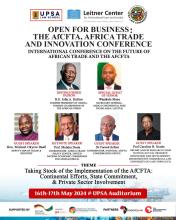Call for Papers: Taking Stock of the Implementation of the AfCFTA: Continental Efforts, State Commitment and Private Sector Involvement, UPSA Law School, Accra, Ghana (Hybrid)
The sponsoring organizations of the International Conference on the Future of African Trade and the AfCFTA invite submissions and participant nominations for a collaborative exchange and discussion at a two-day hybrid conference to take place on May 16 and 17, 2024. The conference working language will be English and will include paper presentations on topics detailed below.
